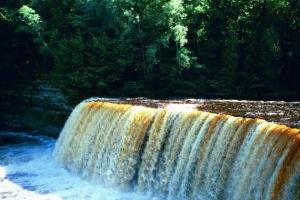General Discussion
Related: Editorials & Other Articles, Issue Forums, Alliance Forums, Region ForumsWhat Makes Flint River Water So Corrosive?
YOU'VE HEARD ABOUT THE LEAD IN FLINT'S MUNICIPAL WATER. BUT WHAT'S CAUSING THE PROBLEM? ONE LIKELY CAUSE MIGHT SURPRISE YOU.
High levels of lead are showing up in Flint's municipal water. But what, exactly, is causing this problem? One of the possible causes might surprise you.
Although the city of Flint formerly purchased its water supply from Detroit, it now draws its municipal water from the Flint River. The lead isn't present in the Flint River, itself. Instead, the lead leaches into the Flint River water as it passes through old water-service lines and pipes.
Any Michigan community that draws its municipal water from a river or inland source rather than from one of the Great Lakes will likely face this problem to some extent. River and inland-source water contains higher concentrations of chloride ions than does water pumped directly from one of the Great Lakes. Why? Perhaps surprisingly, one of the primary reasons is the overuse of salt to deice our roads in the winter. As salt molecules dissolve in water, the negative chloride ions are separated from the positive metal ions. These chloride ions become concentrated in runoff, which makes its way into our streams, rivers, and other waterways.
The negative chloride ions are corrosive, so when the high-chloride water is pumped through lead pipes (or iron and copper pipes joined together with lead solder), lead leaches into the water. It's as simple as that.
Why isn't this happening to the same degree in other places, like Detroit for example? Surely Detroit has old lead pipes, too. Right? Absolutely. But Detroit draws its municipal water directly from the Great Lakes, and water pumped from the big lakes simply isn't as corrosive.
http://www.fixthemitten.com/blog/what-makes-flint-river-water-so-corrosive
-----------------------------------------------------------------------------------------------
I haven't seen many explanations of where the lead was coming from or why the water was so polluted. Thought this article was helpful.
Sherman A1
(38,958 posts)very interesting![]()
1939
(1,683 posts)When I was studying water supply ad water purification in my Sanitary Engineering classes (some years back), testing for chlorides in the output of the purification process wasn't a consideration. We tested for Biological Oxygen Demand (presence of animal and human waste in the water) and heavy metal particles.
We tested to see if we should give it an extra shot of chlorine on bad days. Bad days are when the source has a higher content of pollution (common if your source river is flooding).
This sounds like no one realized just how bad and obsolete the pipes were.
oberliner
(58,724 posts)Where have you read that?
1939
(1,683 posts)oberliner
(58,724 posts)I find that hard to believe.
Paulie
(8,462 posts)As required by federal law. Criminal malfeasance.
JonathanRackham
(1,604 posts)Depending upon the compound some can be nasty.
Gman
(24,780 posts)JustABozoOnThisBus
(23,354 posts)Even without the road-salt explanation, they can become acidic because the water "steeps" forest leaves, creating a sort of tea.
A pleasant example:
http://www.gowaterfalling.com/waterfalls/tahquamenon.shtml

AngryAmish
(25,704 posts)JonathanRackham
(1,604 posts)The salt (sodium + chlorine) goes all the way through the tap, it'd be interesting to see the effect on blood pressure on the local population (due to the salt). Lead poisoning in the pet population?
The free ions promote dielectric corrosion, similar to corrosion you see on cars in the winter in the northern states. (Part of the Rust Belt name.) I think the compound that forms must be lead chloride. It's not highly soluble, but because the water flows through house pipes chlorine ions leach the lead from the pipe joints in older houses. The lead leaching problem occurs from water plant intake through the house taps. In modern plumbing construction lead in solder is banned, but older houses/cities are loaded with leaded joints and plumbing fixtures. (Pure lead pipe still exist in many 1900 era houses in Europe, Buckingham Palace is loaded with it.)
So the chlorine and lead are accounted for, what happened to the sodium ions? What other toxic compounds formed?
Without the chlorine to cause the dielectric corrosion, lead joints passivize and lead oxide forms. It just sits there neutral and water just flows over it without causing problems.
My county issues an annual potable water quality report complete with translation. It's produced by the water authority and blessed by the health department. People at so many levels in Michigan are responsible for this from the water plant/county and city level right up through the governor's office.
This is a good case for technical people to run for office instead of professional politicians and lawyers. We actually need a blend of people to make it all work, right now the elected ranks lack technical persons.